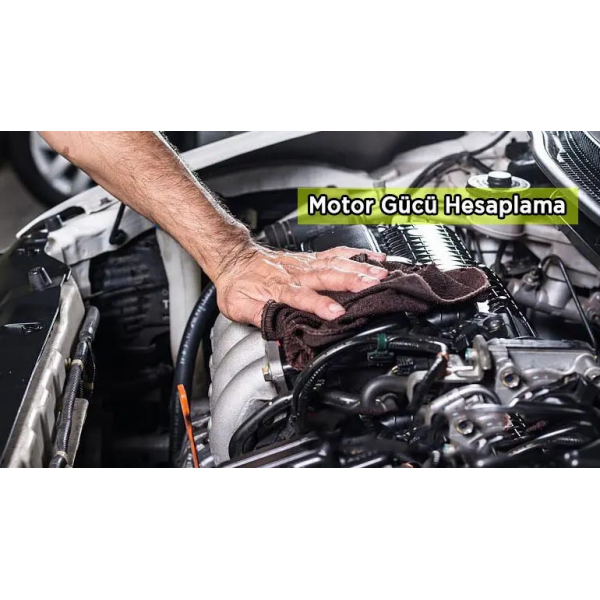Engine Power and Calculation

Engine Power Engine power was first used by James Watt in 1872. With the development and progress of technology, it has come to the forefront. The performance of vehicles is often directly related to engine power. Engine power is a feature that indicates how much power a vehicle's engine can produce and its performance. Vehicle manufacturers express engine power in horsepower (hp) or kilowatts (kW). How Engine Power is Calculated?
Engine Power and Calculation
Engine Power Engine power was first used by James Watt in 1872. With the development and progress of technology, it has come to the forefront. The performance of vehicles is often directly related to engine power. Engine power is a feature that indicates how much power a vehicle's engine can produce and its performance. Vehicle manufacturers express engine power in horsepower (hp) or kilowatts (kW). How Engine Power is Calculated? The process of calculating the engine power of automobiles is quite simple and is related to the basic factors, torque and speed. The engine power is expressed in kilowatts in the license plates of the cars. Therefore, the kilowatt power must first be multiplied by 1.341. In addition, there are some information that people should have. These; 1 kilowatt is equal to 1.341 horsepower and 1 horsepower is equal to 0.745 horsepower. Engine Power Calculation Methods Engine power in vehicles is usually calculated in two main ways:
1. Calculating Motor Power According to DIN Norms The engine power is calculated according to DIN (Deutsches Institut für Normung - German Standards Institute) standards. According to these standards, engine power is measured at the output of the engine shaft. The DIN horsepower is shown in the technical data of the vehicle and usually indicates the maximum power output of the engine. 2. Calculating Engine Power According to SAE Norms Engine power calculated according to SAE (Society of Automotive Engineers) standards provides a more realistic value. According to SAE standards, engine power is calculated based on the power at the wheels. This method provides more accurate results by calculating mechanical losses and powertrain efficiency. Factors Affecting Engine Power Engine power in vehicles is determined by several key factors:
1. Tork The rotational force in the motor is called torque and is usually measured in Newton meters (Nm). As seen in the engine power formula, engine power is directly related to torque. A high torque value provides better acceleration and acceleration capability. 2.Turnover Speed Engine speed directly affects engine power. Rotational speed refers to the number of rotations the engine makes in one minute and is often measured in revolutions per minute (rpm). Higher speeds produce more power, while lower speeds provide more torque. 3. Fuel and Air Mixing Engine power is also related to the effective and efficient combustion of the fuel and air mixture supplied to the engine. The energy that accumulates during the combustion of the fuel enables the engine to generate power.
4. Mechanical Efficiency Engine power is also influenced by mechanical efficiency. Friction, heating and other mechanical losses within the engine can reduce the performance of engine power.
Effects on Performance Engine power in vehicles has a significant impact on performance. Vehicles with high engine power generally provide better acceleration and acceleration. At the same time, climbing power and top speed times have been observed to be lower. However, engine power is not the only factor that determines a vehicle's performance. The performance of vehicles is also influenced by gear ratios, weight distribution, aerodynamics, tires and a whole host of other factors. Plus, high engine power usually leads to higher fuel consumption, which is why vehicle manufacturers work to achieve a balance between power and fuel efficiency.
Conclusion: Engine power in vehicles is the most important factor that determines the performance and functioning of the vehicle. Engine power is related to various factors such as torque and speed and affects the performance characteristics of the vehicle such as acceleration, acceleration and climbing ability. However, it is not enough to consider engine power alone when assessing performance, as other factors also contribute significantly to performance. When choosing a vehicle, it is important to consider power, fuel economy and other operational characteristics in a balanced way.
Aynı Kategoriden
- Differences Between Saildiag Diagnostic Device and Dimsport New Trasdata ECU/TCU Programming Tool
- Differences Between KT200 II and AlienTech KESS v3 Ecu Programming Tools
- Differences Between KT200 II and Magic Flex Ecu Programming Tool
- KT200 ECU Programming Device: Power and Performance in the Automotive World
- What is SID321 ECU Unlocking Device (Key Start Emulator)?






 All Categories
All Categories
Yorumlar
Yorum Yazın